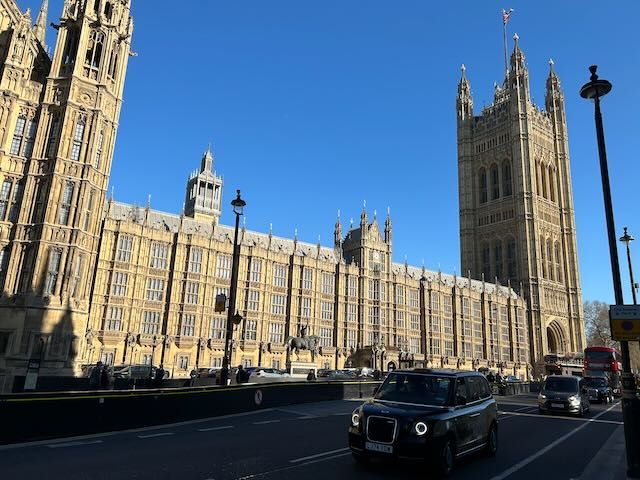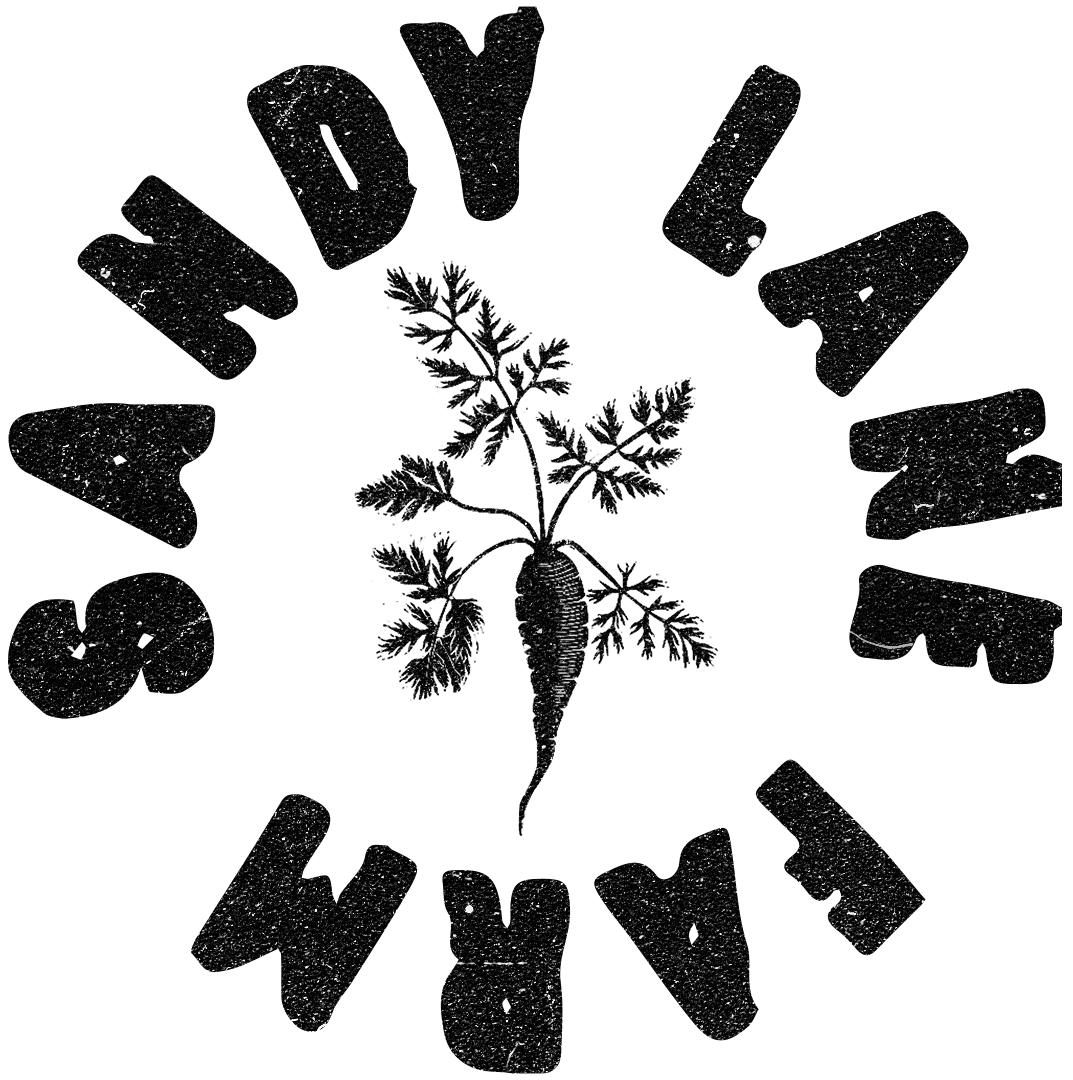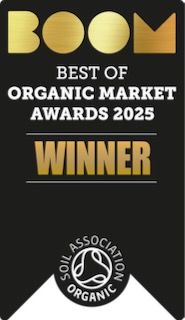Six Inches of Soil at parliament

I was asked by the production team of the film "Six Inches of Soil” to be part of a meeting on April 1st in the Houses of Parliament to discuss with MPs and Peers how regenerative agriculture (Regen) can deal with a number of issues on the governmental agenda - and that it is worth supporting.
The event was sponsored by Daniel Zeichner MP, the minister for food security and rural affairs, and who, controversially, suddenly closed the Sustainable Farming Incentive (SFI) for new applications week before last. This is the program that was to replace the old EU farming subsidies to a program that rewarded farmers for looking after nature, reducing pollution from pesticides, fertilisers and other chemicals, and for outreach programs such as tours and education.
There was a short screening of 10 minutes of the film and a panel discussion with leading proponents of Regen. I was there representing small scale, organic farming (which is the gold standard of regenerative agriculture) and also as someone who is working on projects to enable small scale farming to break into supply chains previously the preserve of much larger organisations. Two examples of this is the Growing Good software platform that we use for our veg boxes. We co-developed this with Steve Sidhu and around 50 other growers are now using it to build a better online sales channel with less admin burden. And we are also part of Good Food Oxfordshire’s OxFarmToFork program that is grouping suppliers of "agro-ecological” produce (farming with nature) into procurement supply chains in Oxford.
There were many interesting points about how the Regen type of farming can be so much more than yield-at-all-costs.
Some examples are:
- Water companies are now starting to work with farmers as they cannot remove many of the artificial inputs from water supplies. At the moment, the only thing they can do is mix enough fresh water to dilute any toxins to “safe” levels. We received a visit last week from Thames Water on this subject, and were told, “You’re organic, so there won't be any visits, advice or support for farmers like you” i.e. you’re not a problem, we’re not going to spend resources on you! The funding therefore goes to the systems that cause the problems.
- Healthy soils, which are central to Regen, hold more carbon, hold more flood waters back and support greater biodiversity. At the moment so much funding is being spent on reacting to these problems rather than working to a system that prevents them.
- Healthy soil, full of biological life, is also much more resilient in times of flood or drought so it should be a core focus of our food security policy as climate change and international unrest increases challenges to production.
From the discussions at parliament, it was fascinating to see just how blinkered policy making appears to be - focussing on specific solutions rather than holistic solutions, and that the focus really is on ‘large scale’ farming and food production. While I see it is easier to deal with finite, tangible problems with a subset of very large organisations,it seems that this can lead to unintended, often conflicting, consequences. My impression (and purely my conjecture) is that supporting small scale farming is not seen as significant or that it is inefficient and open to abuse of public funds.
Supply chain turns out to be a critical factor, though of course it should be a 'supply web', not a linear chain. Andy Cato of Wild Farmed, was part of the panel too and has been instrumental in bringing Regen agricultural practices to mainstream media attention. He told us that they can get farmers to try Regen methods, but supermarkets are not interested, as in their words, the customer demand isn’t there. A core part of Wild Farmed's role is public visibility to start generating the demand necessary to get their flour and sourdough bread into more supermarkets. I guess an important point here is that there are risks to everyone when changing the system, and that public support goes a long way in making that happen.
In some respects, I was wondering why I was there? I wasn’t in the film, we're not a large scale producer or in the large scale supply chains, we farm organically (a step up from Regen), I’m not a lobbyist or think-tank trying to influence government decisions. But it did make me think seriously about what we do on the farm and what the benefits are of growing veg in an organic system.
I think to list a few they are:
- Biodiversity is at the heart of what we do - it is not a nod to doing something better. It is actually relying on a balanced ecosystem that controls pests by itself, and that makes smaller levels of fertility more available for healthy plant growth. It has taken us a long time to build up nature’s capital - and for people looking to move this way, there are real risks of short term loss of yield, which is a scary prospect.
- We are committed to showing what we do and to share our workings - through open days, talks, tours, social media, mailers and simply talking to customers face-to-face in the farm shop or markets. Operating at a smaller scale makes it easier to relate to what we do and feedback is immediate, closely directed at all the people who work here. This makes us very agile. The speed with which many small farms plugged the gaps in food shortages during the pandemic was testament to that. Creating open dialogue with customers has helped us to educate ourselves as well as those who shop with us and who wish to learn more about what we do here. The day I went to parliament started off with a farm tour for 30 Brookes University students studying Environmental Science, then moved to a farm tour with Baxter Story about catering procurement for more Oxford colleges, then ended in Parliament talking about national farming matters!
- We are always looking to expand routes to market. With the Growing Good platform and OxFarmToFork, we’re not resting on our laurels or looking to keep the status quo. We’re trying to raise the bar for all farms our size. If you are a small, lean operation, it makes it much easier to give things like this a go.
- Community. We have fantastic, loyal customers, some of whom volunteer in the market garden, many of whom take the time to remind us that what we are doing is worth it. We give out free coffee and cake for the local litter picking team. We are a hub for Farmability, a set of co-farmers with Special Educational Needs that participate meaningfully on the farm. Small farms are really able to create the personal connections needed to make all this happen. Without trying to virtue signal or blow our own trumpet, small farms can really be at the heart of meaningful change.
But of course, there is a caveat to all of this. Cate and I started at the right time to take on a farm that had had a heyday but had started to struggle to make ends meet. We are striving for ‘sustainable success’ rather than ‘overnight success’ and that takes innovative, dynamic thinking and relentless hard work. We have the support of family and customers, we have the security of farming on this land (for at least the medium term!) and Cate & I had previous careers that enabled us to have the basics like an existing roof over our head. It was still a long, hard slog living on a day-by-day basis until we have been able to grow the team - from that point things have started to become more sustainable.
There are so many wide ranging benefits to the way we farm but it is really difficult to get to a sustainable business. Just when you think things are on an even keel, policies change, the economy goes into free fall etc etc. What can be done using government policy? I’m no politician, but some things could include:
- Land security - Incentivise larger farms or land owners to give the opportunity and security for new entrants to start and invest in an organic farming business, or make it easier for a new entrant to purchase land for farming enterprises
- Commit to & lock in supporting nature friendly farming for long to benefit to the land around us
- Give financial support in the early years to get businesses established
- Provide ongoing education of those using best farming practices and encourage peer support to spread best practice
- Support family-succession - farming this way is challenging and hard work. There must be ways of encouraging new generations to participate in nature friendly farming
We’re well aware that we can exist in a bubble here at the farm so I’d be interested in hearing feedback on whether this makes sense. What makes you want to support us as a business and what else can be done to support small scale organic farming.
George





